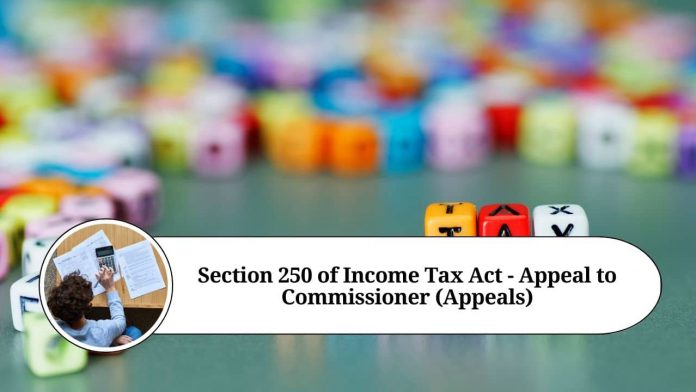Section 250 of the Income Tax Act provides an opportunity for taxpayers who are aggrieved by any order passed by the Assessing Officer to file an appeal with the Commissioner (Appeals). The Commissioner (Appeals) is an appellate authority that has the power to hear and dispose of appeals filed by taxpayers against orders passed by the Assessing Officer. This section lays down the procedure for filing an appeal and the powers of the Commissioner (Appeals) in dealing with such appeals.
Who can file an appeal with the Commissioner (Appeals)
Under section 250 of the Income Tax Act, any person aggrieved by an order passed by the Assessing Officer can file an appeal with the Commissioner (Appeals). This includes individuals, Hindu Undivided Families (HUFs), firms, companies, and any other entity liable to pay income tax. The appeal can be filed in respect of any disputed issue, including the quantum of income tax liability, disallowance of expenses, and assessment of income.
The time limit for filing an appeal with the Commissioner (Appeals)
The appeal to the Commissioner (Appeals) should be filed within 30 days from the date of receipt of the order passed by the Assessing Officer. However, the Commissioner (Appeals) may admit an appeal after the expiry of the 30 days if he is satisfied that there was sufficient cause for the delay in filing the appeal.
Procedure for filing an appeal with the Commissioner (Appeals)
The appeal to the Commissioner (Appeals) should be filed in the prescribed form and manner as per the Income Tax Rules. The appellant should also pay the necessary fees along with the appeal. The appeal should contain the following details:
- The name and address of the appellant
- The assessment year in respect of which the appeal is being filed
- The order against which the appeal is being filed
- The grounds on which the appeal is being filed
- The relief sought by the appellant
The appeal should be accompanied by a copy of the order passed by the Assessing Officer and any other relevant documents in support of the grounds of appeal.
Powers of the Commissioner (Appeals)
The Commissioner (Appeals) has the power to examine the order passed by the Assessing Officer and any other evidence produced by the appellant. He may also make further inquiries if he deems it necessary. The Commissioner (Appeals) may confirm, modify or cancel the order passed by the Assessing Officer. He may also enhance the assessment if he is satisfied that the income of the appellant has been under-assessed.
Procedure for disposal of appeals by the Commissioner (Appeals)
The Commissioner (Appeals) should give an opportunity of being heard to the appellant and the Assessing Officer before disposing of the appeal. He may also admit any additional evidence produced by the appellant or the Assessing Officer if he is satisfied that the same could not be produced earlier despite due diligence.
The Commissioner (Appeals) should dispose of the appeal within one year from the end of the financial year in which the appeal is filed. However, he may extend the time for disposal of the appeal for a further period not exceeding one year with the prior approval of the Chief Commissioner or Director General of Income Tax.
Appeals to the Appellate Tribunal and High Court
If the appellant is not satisfied with the order passed by the Commissioner (Appeals), he may file an appeal with the Appellate Tribunal within 60 days from the date of receipt of the order. The Tribunal is the next appellate authority and has the power to hear and dispose of appeals filed by taxpayers against orders passed by the Commissioner (Appeals).
If the appellant is not satisfied with the order passed by the Appellate Tribunal, he may file an appeal with the High Court within 120 days from the date of receipt of the order. The High Court may admit the appeal if it is satisfied that the case involves a substantial question of law. The decision of the High Court is final and binding on both the appellant and the Income Tax Department.
Conclusion:
Section 250 of the Income Tax Act provides legal recourse for taxpayers who are aggrieved by any order passed by the Assessing Officer. The Commissioner (Appeals) is an appellate authority that has the power to hear and dispose of appeals filed by taxpayers against orders passed by the Assessing Officer. The appeal should be filed within the prescribed time limit and in the prescribed form and manner.
The Commissioner (Appeals) has the power to examine the order passed by the Assessing Officer and any other evidence produced by the appellant. If the appellant is not satisfied with the order passed by the Commissioner (Appeals), he may file an appeal with the Appellate Tribunal and subsequently with the High Court.
It is essential for taxpayers to be aware of their rights and legal recourse under the Income Tax Act and to exercise them in a timely and appropriate manner.




















